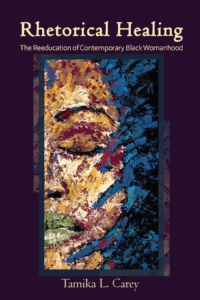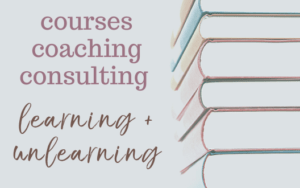I’m particularly excited about this Q&A blog post with Tamika Carey, Ph.D., an interdisciplinary scholar whose work is not only shaping the fields of cultural rhetorics, African American rhetorics, and feminist rhetorics but also deeply impactful for literacy studies, cultural studies, and women’s and gender studies. Tamika Carey is an Associate Professor of English at the University of Virginia, an award-winning author, and a committed educator.
I came to know Tamika through her conference presentations and research on Black women’s intellectual histories, writing traditions, healing, and wellness. Her first book, Rhetorical Healing: The Reeducation of Contemporary Black Womanhood, is one I regularly recommend as a model of really valuing—centering—Black women’s wellness, which includes an important critique of idealized states of wellness. And Tamika’s newer research on hostility toward Black women intellectuals is incredibly important at this time. Tamika shows how toxic lashing out culture (trolling, doxing, and more) harms Black women and acts as part of larger cultural commitments to ahistorical, acritical flattening (and much more than flattening). Threats, hostility, and aggression thrive in these ahistorical, acricial conditions, as we see in story after story these days.
I hope you’ll read this Q&A post to learn more about Tamika’s research and teaching work as well as her call to being in this work for the long haul—with endurance.
I know Tamika’s commitments to be deep and enduring. Tamika is driven for wellness and liberation for Black women, and she exemplifies Black women intellectualism, including in the use of citation as honoring and lifting up, as you’ll find throughout this piece (#CiteBlackWomen). She shows us the importance of knowing how injustice is playing out now (reckoning with history and harm) and cautions against staying in false comfort or rushing toward easy answers.
Join me in reading Tamika’s words and asking, along with her: How do we (fail to) prioritize and protect Black women intellectuals and intellectualism? And how will we show up for the reckoning needed to do so?
Interview with Tamika L. Carey, Ph.D.
1. What are the deep commitments that motivate all of your work, particularly galvanizing work on Black women intellectualism?
When I think back on how I came to make Black women’s intellectualism a site, ethic, and inspiration for my work, I see how much the concepts of home and wellness shape my career.
I began my doctoral studies as a former high-school teacher with an investment in language politics and pedagogy because I had read the work of scholars like Geneva Smitherman and Keith Gilyard during my MA program. The first year of my doctoral program was a bit of a culture shock though. I was not struggling to do the work; I simply felt out of place. I did not immediately see how the sites and spaces that affirmed me as a communicator and writer—spaces like the Black church and other vernacular spaces where I had began to develop my voice and sense of self in the world—connected to some of the theories I was learning. And I deeply missed my students because I did not have to teach that year.
What I now understand as homesickness intersected with my first experiences taking seminars in Feminist rhetoric, Black feminism, literacy studies, and an independent study I took in African American rhetoric. Those classes challenged me to think about why so many of the Black women I sought to study in the history of rhetoric courses I was taking—women like Anna Julia Cooper, Septima Clark, and Geneva Smitherman—were teacher-activists. And I found myself asking:
- What types of spaces, hidden and unhidden, secular or sacred, enabled them to develop the subversive knowledges they relied on to have and use their voices as means of influence then?
- How did they push against power and encode their writing and speaking with it?
- What has it meant and would it mean to educate Black women and other groups with an eye for their own futures as well as the futures of their communities?
- Can those forms of education be hijacked for other purposes?
I took up those questions in Rhetorical Healing: The Reeducation of Contemporary Black Womanhood, my first book project. The book traces discourses on healing throughout Black women’s literature and film as complex wellness campaigns that, directly or indirectly, market a form of rhetorical reeducation as a way to redress social ills.

Book cover of Tamika L. Carey’s Rhetorical Healing: The Reeducation of Contemporary Black Womanhood.
The arguments about healing I explored in the book politicized my understanding of wellness, but the backlash and the punishment campaigns I was starting to observe targeting Black women professors, public figures, and citizens convinced me that it must be the mandate for my work. Frankly, it has scared me to see some of my peer professors—contemporary intellectuals—experiencing acts of doxing, smear campaigns, and threats of rape and worse for engaging in the very kinds of questioning, critique, and truth-telling that seems essential to civic discourse.
I started this work by examining cultures of hostility towards Black women. More recently, I have been working to understand this strand that some are calling cancel culture in the next book project. Wellness must also mean safety. My hope is that studying risk and Black womanhood will enrich rhetorical and literacy education by giving us additional examples of the physical, material, and life consequences of language.
2. What are you learning about why the critical Black women thinker is under attack? And how do we keep her well?
I’ve been identifying a number of troubling patterns with this research. One of these can be seen in the backlash that Melissa Harris Perry, the subject of one of my essays, experienced in late 2013 after off-hand remarks about former presidential candidate Mitt Romney’s African American grandchild. The lack of critical vocabulary we have for understanding perceptions of error involving Black women (particularly at the language or social level) seem to give people license to act violently.
Said differently, the ease in which onlookers reduced the situation down to a simple social faux pas revealed inattention to, if not outright denial of, the intersections of race, gender, and more. It’s as if there was some kind of commitment to being ahistorical and acritical among onlookers.
As a writing teacher who ultimately cares about all my students, I think this kind of orientation, or social positioning if you will, is irresponsible. Wellness means we have to strive to understand how oppression operates as well as what we must do to stop and redress it. If we are committed to liberation, then we can’t fast-forward to solutions and we can’t use watered-down and vague concepts as we do so.
3. How do you bring this work to the classroom?
These commitments show up in the architecture of my courses. I teach graduate courses in Writing Pedagogy, Feminist Rhetorics, and African American Rhetorics, and I teach undergraduate courses in those same areas as well as in Black Women’s Writing and Rhetoric, and Life Writing.
As I once discovered while teaching Claudia Rankine’s Citizen to a class of junior-level Honors English students and having a young man tell me that Rankine’s exploration of race and microaggressions made his “hands sweat,” we can’t assume we will be able to have the hard conversations about rhetoric and social consequences without laying the foundation for them to do so.
I begin nearly all of my courses by introducing vocabulary—terms like complicity, agency, privilege, intersectionality, systems theories, and more—so that when the affect becomes too strong, we can go back to the vocabulary. At best, this foundation seems to foster an atmosphere where we can move between personal associations and reactions to broader observations and critiques about how institutions work and the roles we carry out within them.
Beyond the initial vocabulary I assign, I also begin nearly all of my classes with a unit on conditions. I take the concept of “conditions” from Elaine Richardson’s work on the “Black Rhetorical Condition” in African American Literacies. Of course, the unit differs according to the class. Sometimes, I teach it as a preliminary introduction to a disciplinary conversation. Other times, the conditions unit is an introduction to historical practices and trends. We can’t study rhetoric or enact it ethically without knowing the subjectivities and experiences and more that lead to lines of argument. In this way, we explore the fuller context around a writing to understand possible forms of resistance to the speaker.
Finally, I try not to centralize “success” as the best paradigm for study in my courses. One of the articles that has proven so useful to my thinking is Gwendolyn Pough’s “Rhetoric That Should Have Moved the People: Rethinking the Black Panther Party.” I like this piece because it underscores how a line of argumentation can be visible and influential, and yet still fall short of its liberating potential or carry within it something problematic. These complexities—not just the successes—help illuminate the real-world tensions and consequences my students will face as writers.
A lot of my pedagogy is complicating assumptions and figuring out the language and tools we need to imagine reactions and to work through the hard stuff.
4. So, what is needed of us now in striving toward “everyday living for justice”?
If the year 2020 has shown me anything so far, it is that those of us invested in this work will need endurance. Adam Banks used to talk about the need for “long distance runners” when teaching African American Rhetoric. His use of this quote seems so relevant right now as some of us are being asked to join conversations about how to undo or redress structural inequities in the light of racial and social protest. I learned quickly that this type of work can be all consuming. Some of it means we will have to temper the impulse to rush to solutions. I have watched conversations break down completely because the people who felt as though they were being attacked were so invested in demonstrating that they are “good people” that we couldn’t even get the conversation off the ground.
Gestures are easy. Reckoning is hard.
We will need to prepare for sustained, complex, and uncomfortable conversations, ones where we work with the critiques instead of personalizing, blocking, or becoming defensive. I am adamant that this work does not fall solely on the shoulders of Black women and other groups who have already been disadvantaged by these systems. Liberation takes a long time. We need strategies for replenishing ourselves and keeping a semblance of a quality of life if we are to pursue justice.
This is some of what wellness means to me.
—
This interview is conducted by Beth Godbee, Ph.D. with Tamika Carey, Ph.D. for Heart-Head-Hands.com.
In addition to supporting the work of Heart-Head-Hands: Everyday Living for Justice by subscribing via Patreon, consider purchasing a copy of Tamika’s book: Rhetorical Healing: The Reeducation of Contemporary Black Womanhood. And check out more of her scholarship on Academia.edu.
Consider subscribing to the newsletter for updates about most posts like this. Thanks!




Leave a Reply